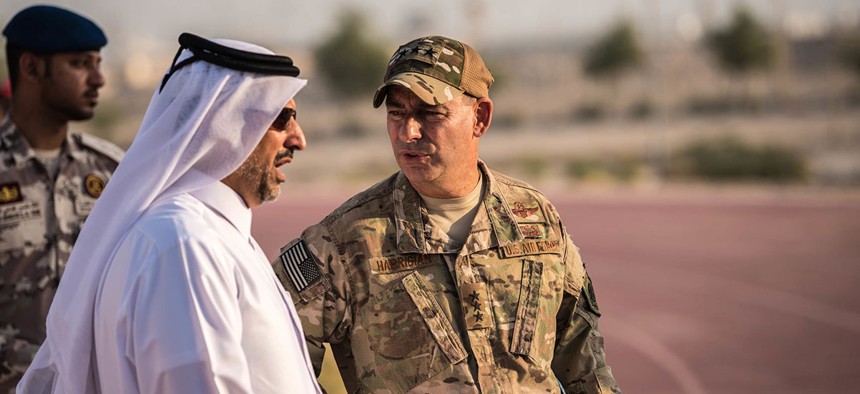
Lt. Gen. Jeffrey Harrigan, commander of the U.S. Air Forces Central Command, speaks with a Qatari Emiri Air Force leader at the QEAF Family Cultural Exchange at Al Udeid Air Base in December. Master Sgt. Phil Speck/Defense Department
Qatar Wants to Host U.S. Ships, Expand Air Base For American Families
Amid the Saudi-led blockade, the Qatari defense minister came to Washington seeking deeper ties with U.S.
In an effort to deepen ties with U.S. military, Qatar’s defense minister has laid out plans that would allow the U.S, Navy to base warships there and allow American families to live at a massive air base outside of Doha.
The move comes nearly eight months after Gulf Cooperation Council members Saudi Arabia, United Arab Emirates, and Bahrain cut off diplomatic ties with Qatar, accusing it of supporting terrorism. The U.S. relies on all four counties for military basing and diplomatic support in the region.
Qatar is planning to build about 200 houses for American families, increase capacity at dormitories, and construct an entertainment facility at Al Udeid Air Base, a sprawling military complex that hosts U.S. Air Force Central Command and its operations center, which oversees U.S. military operations in the Middle East and Afghanistan.
“We’ve been studying the needs and how to make our guests comfortable,” Qatar’s defense minister Khalid Bin Mohammad Al-Attiyah said in an interview with Defense One on Tuesday evening. “I believe it’s well received.”
The base is currently host to more than 9,000 American and allied military personnel and about 100 military aircraft, according to an U.S. Air Force spokesman.
The U.S. moved its air operations center from Saudi Arabia to Al Udeid in 2003. Since then, the base has expanded dramatically. Airmen used to live in trailers without attached bathroom facilities, but now have more modern, dormitory-style apartments. Unlike U.S. bases in Germany and Japan, families do not live at the base, and most airmen there are considered temporarily deployed. The families of some officers deployed to the base for more than a year live in an American compound in nearby Doha.
“The Air Force is currently planning and executing more than a dozen infrastructure improvement projects across the base, including several new warehouses, taxiway lighting improvements, new training facilities and improvements to existing ones, dining hall upgrades, a new maintenance workshop, and connecting the base sewage system to Qatari system outside the base,” the Air Force spokesman wrote in an email. “These construction projects represent a transition from an expeditionary environment with temporary facilities, to a base with an enduring infrastructure capable of sustaining long-term operations.”
Qatar’s offer to expand facilities at the base comes as the U.S. military is planning a strategic shift to meet great-power competitors Russia and China, and focus less on counterterrorism operations largely planned and staged from Middle East bases like Al Udeid.
Al-Attiyah said he is not concerned that the new U.S. focus will diminish its need for the base.
“As we speak now, the commitment is a long-term commitment,” the minister said. “I don’t see anything on the horizon which indicates that our fellow Americans are going to leave in the near future.”
Qatar is also building new naval ports, that will be able to accomodate U.S. warships, for port visits or permanent basing, Al-Attiyah said.
“How we can improve our military Navy ports so we can accomodate also the American Navy if needed,” he said.
The U.S. Navy has its Middle East headquarters in Bahrain and also uses ports in the United Arab Emirates, two of the nations that have cut diplomatic relations with Qatar.
Earlier Tuesday, Secretary of State Rex Tillerson and Defense Secretary Jim Mattis hosted Al-Attiyah and Qatar Foreign Minister Sheikh Mohammed bin Abdulrahman al-Thani participated in the first U.S.-Qatar strategic dialogue, which is expected to become an annual meeting between the countries military and diplomatic leaders.
Tillerson on Tuesday called on “all parties minimize rhetoric, exercise restraint to avoid further escalation, and work toward a resolution.” He also said “Qatar has made significant progress to improve efforts to combat terrorism.
Al-Attiyah said Qatar has a “2040 vision” for military cooperation with the U.S. He touted the diverse set arms Qatar has purchased from the U.S. in recent years, to include F-15 fighter jets, C-17 and C-130 cargo planes, Apache attack helicopters and Patriot missile interceptors.
“We talked about the coordination and the synergy, training, of all the systems,” he said.







